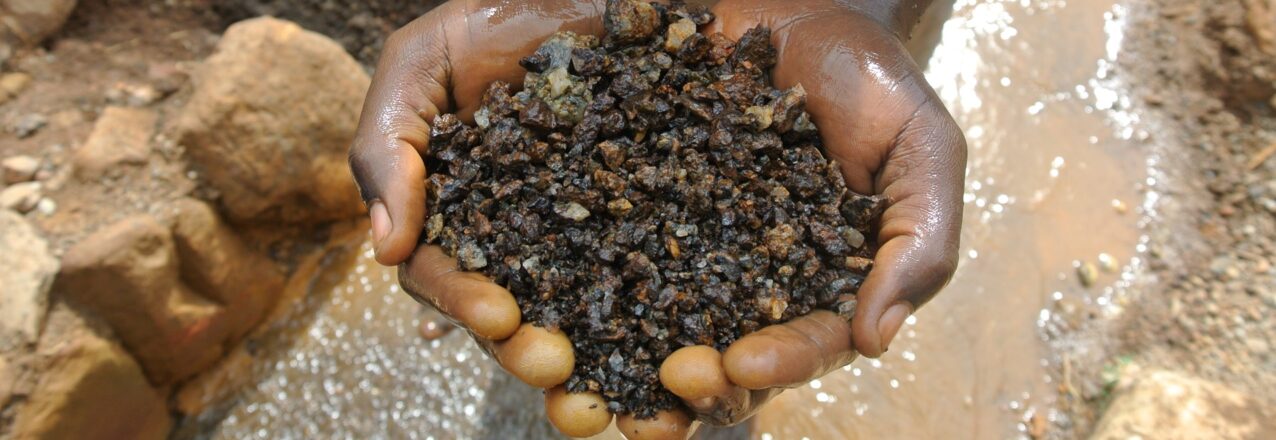The U.S. government-supported Public-Private Alliance for Responsible Minerals Trade (PPA) offers a successful model for advancing responsible mineral sourcing in the Democratic Republic of the Congo (DRC) and Great Lakes Region of Central Africa.
Minerals needed for our electronic devices such as computers and cellphones and renewable technologies such as electric vehicles are often sourced from conflict-affected countries with weak governance systems including the Democratic Republic of the Congo. For these countries, mineral wealth can be a double-edged sword. Mining is a crucial economic sector and a direct source of livelihoods for an estimated two million artisanal and small-scale miners, but the sector is also known for its damaging effects: it can finance armed group activity, fuel corruption, and cause vast environmental damage, labor violations, and human rights abuses.
Global demand for minerals is surging, especially for those minerals needed for low carbon technologies. More than ever before, we need better models to support responsible sourcing of minerals from high-risk areas. Responsible sourcing of minerals is an umbrella term used to describe sourcing designed to be “socially responsible,” “green,” or “sustainable” by implementing supply chain due diligence and sustainability schemes (Brink et al., 2019). For the last decade, the Public-Private Alliance for Responsible Minerals Trade (PPA) has advanced responsible sourcing of minerals from the DRC and the Great Lakes Region of Central Africa.
The Alliance is a multi-stakeholder effort that brings together leaders from the private sector, government, and civil society to advance supply chain solutions to the issue of conflict minerals. It focuses on minerals linked to conflict and instability in the region and prioritizes tin, tantalum, tungsten, and gold. Jointly founded in 2011 by USAID and Department of State, the the Alliance offers funding and coordination support to organizations working in the Great Lakes region to develop verifiable conflict-free supply chains; align chain-of-custody programs and practices; encourage responsible sourcing; promote transparency; and bolster in-region civil society and governmental capacity. The Public-Private Alliance for Responsible Minerals Trade Secretariat is managed by the civil society organization RESOLVE.
After ten years of supporting responsible sourcing, the leaders and influencers that make up the Alliance are assessing how to best address the next generation of challenges in responsible sourcing. Since its inception, the Alliance has raised more than $2.5 million in private sector contributions, with an additional $36 million in parallel funding from USAID for mining governance and traceability projects. Public-Private Alliance for Responsible Minerals Trade-supported projects include early support for the development of a conflict-free artisanal gold supply chain that led to the first export of conflict-free gold from the DRC to the United States, piloting community-based interventions to mitigate human rights abuses and increase women’s leadership in mining communities, and identifying and addressing barriers to responsible finance for the artisanal sector. Successful PPA projects such as conflict-free gold supply chains, may be scaled-up by large donors such as USAID.
Virtual Delegation and the Next Generation
In December 2021, the Alliance held a virtual delegation to the Great Lakes Region of Central Africa, where nearly 70 attendees from the private sector, civil society, and the U.S. government discussed shared objectives and alignment and U.S. Embassy priorities.
Lucy Tamlyn, U.S. Ambassador to the Central African Republic; Michael Hammer, U.S. Ambassador to the Democratic Republic of the Congo; and Marcia Eugenio, Director of the Office of Child Labor, Forced Labor, and Human Trafficking at the U.S. Department of Labor, opened the virtual delegation. PPA speakers included representatives from Apple, Google, Intel, and the civil society organization, IMPACT, among others.
“With its abundance of natural resources, the DRC is at the heart of the critical minerals discussion and will play a central role in the future of green energy,” Ambassador Hammer said in the opening remarks.
The Alliance members expressed continued commitment to responsible sourcing and identified shared challenges that would benefit from deeper engagement and collaboration with U.S. embassies in the region. Alyssa Newman of Google reiterated that the Alliance, “is an important platform for connecting minerals governance to other issues and projects Google is investing in” and that Google would like it to continue to advance “due diligence and ethical supply chains, human rights, labor rights, and strengthen civil society and inclusive economic development.” Other potential areas of future collaboration that were raised included tax harmonization, the simplification of legal export processes, public-private co-investment opportunities, and the importance of tackling systemic issues including fiscal and governance reforms and land tenure.
As consumers and governments increasingly demand sustainable and ethical sourcing of minerals, public-private partnerships like the Public-Private Alliance for Responsible Minerals Trade are playing an invaluable role in bringing stakeholders from across the mineral supply chain together to discuss roadblocks and advance key objectives. The Alliance brings large private sector players to the table with civil society organizations and allows members to collectively support promising projects to ensure that increased demand for critical minerals does not come at the expense of local communities. As Intel’s Adam Schafer reflects, “As a downstream company, Intel’s partnership with the PPA [the Alliance] has been a crucial connection to engage with in-region programs and stakeholders to allow a responsible path for mineral sourcing. We look forward to continued collaboration as we work towards our goal to responsibly source all of our critical minerals.”
—
The Public-Private Alliance for Responsible Minerals Trade has a tripartite membership from across 47 partners representing private sector, civil society, and government. Private sector members represent several sectors, including electronics and communications, automotive, aerospace and jewelry. There are 25 member companies, which include Amazon, Apple, Ford, Google, Intel, Microsoft, Signet, and Verizon. PPA’s civil society and academic members come from 16 organizations and trade groups, including Global Communities, IMPACT, IPIS, Pact, Solidaridad, and The Sentry. Government representatives include USAID, US Department of State, US Department of Labor, GIZ, and the International Conference on the Great Lakes Region. The OECD Centre for Responsible Business Conduct is an observer.
Photo credit: Mike Loch


